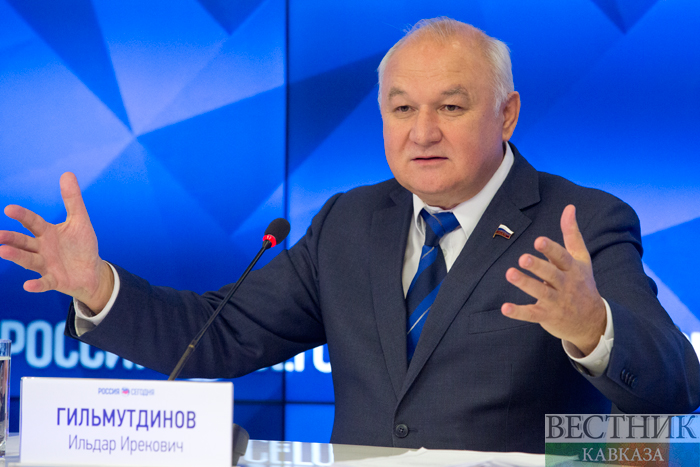The Russian State Duma hosted a panel session "Altai vector of Eurasian integration" with the participation of representatives of both houses of the Russian parliament, employees of relevant ministries and departments, public figures and foreign diplomats. Speaking at the panel session, Ambassador of Azerbaijan to Russia Polad Bulbul oglu said that in modern conditions, the Eurasian policy direction of the post-Soviet states is becoming increasingly important, so the Altai factor has assumed a special role in the Eurasian integration processes: "Over the centuries and even millennia Altai "was the center of interaction of many peoples and entreasured elements of their cultural diversity."
At the same time, the diplomat noted that Russian-Azerbaijani ties are confidential and constructive: "For diplomats, historians, economists, political scientists, cultural scientists of both countries, this topic has always been a priority. Our national leader Heydar Aliyev, who served at the USSR Council of Ministers as the first deputy chairman in Moscow, being a deputy from Altai, initiated and supervised the construction of the largest bridge of Siberia across the Ob River. Heydar Alievich often remembered this memorable event with warm feelings. Such examples are the symbols of our communication on a new stage in history, at a new stage of the present."
Polad Bulbul oglu recalled that in 1992, on the initiative of Azerbaijan and with the participation of the culture ministers of Kyrgyzstan, Kazakhstan, Uzbekistan, Turkey and Turkmenistan, the International Organization of Turkic Culture (TURKSOY) was created: "The main purpose of TURKSOY was cooperation between Turkic peoples in the name of preservation, development and transfer to the future generations of common material and cultural values and monuments. I had the hounour to stand at the origins of TURKSOY and to lead this organization for 14 years. Over the past 27 years, TURKSOY has carried out thousands of projects aimed at supporting and developing the distinctive cultures of each of these peoples. But joint projects, which clearly demonstrated the community and closeness of the Turkic-speaking peoples' cultures, their belonging to the same sources, were even more important."
The Azerbaijani ambassador complained that not everyone in Russia has a positive attitude towards this organization, although it is purely cultural, being outside of politics: "Any pan-Turkism is out of question here, because it is a purely cultural, and the Eurasian space cannot exist without a Turkic-speaking culture. Altai is the ancestral home of not only Turkic-speaking peoples. We know the Mongolian, Tungus-Manchu, Korean, Japanese–Ryukyuan families. It is believed that all these peoples in the distant past began their development in Altai. Once they scattered around the world, spread their culture and traditions to all corners of the planet. Many of us have common roots, common origin, common civilizational paths of development."

The participants in the panes session agreed that the processes of integration are becoming focused and systemic, and also noted that there is a positive shift in the perception of the tasks of modern Eurasianism, and Azerbaijan should play an active role in integration.
Chairman of the State Duma Committee for Nationalities Ildar Gilmutdinov told Vestnik Kavkaza that "Russian-Azerbaijani relations have never been negative, they have only been developed. It's not just about economics. We are united by a very large cultural and spiritual community and traditions. I really hope that that the direction and force that we have gained in our relations will only intensify."






